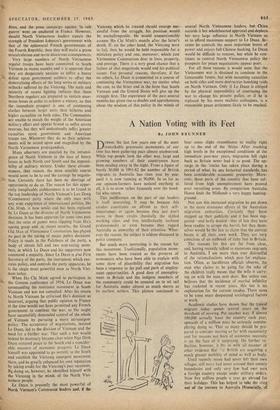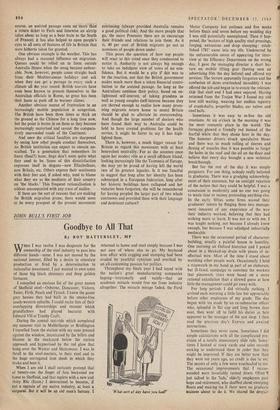A Nation Voting with its Feet
By JOHN BRUNNER
DuRiNG the last few years one of the most remarkable grassroots movements of our time has been gathering pace almost unobserved. While top people look the other way, large and growing numbers of their countrymen have been stealing away in the night. From a figure of barely 30,000 in 1961-62 the number of British migrants to Australia has risen year by year until it is now running at 90,000. In so far as our opinion-formers have noticed anything at all, it is to crow rather fatuously over the hand- ful who return.
This indifference on the part of our leaders is itself interesting. It may be because this exodus constitutes an affront to their self- importance; or again because they just don't move in those circles (basically the skilled working class and less intellectually inclined professionals) or even because they regard Australia as unworthy of their attention. What- ever the reason, the subject is seldom discussed in polite company.
But much more interesting is the reason for this movement. Traditionally, population move- ments have been treated as the preserve of economists who have been able to explain with some show of plausibility that migration has been a response to the pull and push of employ- ment opportunities. A good dose of unemploy- ment in Britain and the indigent members of the community could be counted on to set sail for Australia under almost as much duress as its earliest settlers. This picture continued to
bear some slight resemblance to reality right up to the end of the 'fifties. After reaching high levels in the exceptional conditions of the immediate post-war years, migration fell right back as Britain never had it so good. The up- surge in the 'sixties has taken place during a period of what, by any historical standards, has been considerable economic prosperity. More- over, those parts of the country that have suf- fered from high unemployment have proved poor recruiting areas. By comparison Australia House finds the Midlands a very happy hunting- ground.
Nor can this increased migration be put down to the more strenuous efforts of the Australian migration authorities. Certainly they have stepped up their publicity and it has been sug- gested—and hotly denied—that of late they have been readier to scrape the barrel, but they them- selves would be the last to claim that the current boom is all their own work. They are very conscious of an outbreak of itchy feet in Britain.
The reasons for this are far from clear, and, having recently talked to numerous migrants in Australia, I am more than ever distrustful of the rationalisations which pass for explana- , tion. Often, as hardbitten officials observe, the man who claims to be going for the sake of the children really means that the wife is carry- ing on with the man next door. But unless one believes that the incidence of marital infidelity has rocketed in recent years, this too is no explanation for the current exodus. There seem to be some more deepseated sociological factors at work.
Academic studies have shown that the typical migrant today spends several years on the threshold of moving. Put another way, if almost 100,000 actually leave the country each year, upwards of a million must be seriously conteM- plating doing so. That so many should be pre- pared to consider moving so far with equanimity and for reasons not born of economic necessity is on the face of it surprising. On further re- flection, however, it fits in with all manner of other evidence that '!Ie British are acquiring a much greater mobility of mind as well as body.
Until recently many had never left their own villages, still more had never crossed their county boundaries and only very few had ever seen a foreign country except under military orders. Now five million people a year go abroad for their holidays. This has helped to take the sting out of the journey to Australia (financially, of course, an assisted passage costs no more than a return ticket to Paris and timewise an airtrip takes about as long as a boat train to the South of France); it has also helped to open people's eyes to all sorts of features of life in Britain that were hitherto taken for granted.
One obvious example is the weather. This has always had a seasonal influence on migration. Queues could be relied on to form outside Australia House when the smog became unbear- able. Now, however, people come straight back from their Mediterranean holidays and ask when they can get a passage to enjoy such a climate all the year round. British tourists have even been known to present themselves to the Australian officials in Rome, so great has been their haste to push off to warmer climes.
Another obvious source of frustration to an increasingly mobile population is congestion. The British have been three times as thick on the ground as the Chinese for a long time now, but the point is borne in on them as they become increasingly motorised and savour the compara- tively uncrowded roads of the Continent.
And once the critical faculties are sharpened by seeing how other people conduct themselves, no British institution. can expect to remain un- scathed. To a generation that remembers its finest (final?) hour, fings don't seem quite what they used to be. Some of this dissatisfaction expresses itself in slogans—new Elizabethans, new Britain, etc. Others express their sentiments with their feet and, if asked why, tend to blame what they see as the seediness of their country on 'the blacks.' This frequent rationalisation is seldom accompanied with any trace of malice.
If these are the sort of reasons that are making the British migration prone, there would seem to be every prospect of the present movement continuing (always provided Australia remains a good political risk). And the more people that go, the more Pommies there are to encourage their friends and relations to join them. As it is, 40 per cent of British migrants go out as nominees of people down under.
This poses the question of how top people will react to this trend once they condescend to notice it. Authority is not always big enough to take an indulgent view of votes of no con- fidence. But it would be a pity if this was to be the reaction, not that the British government makes much more than a token financial contri- bution to the assisted passage. So long as the Australians continue their policy, based on en- lightened self-interest, of taking grandma as well as young couples (self-interest because they are shrewd enough to realise how many prom- ising migrants return home to mum) Britain should be glad to alleviate its overcrowding. And though the large number of doctors who have found their way to Australia could be held to have created problems for the health service, it might be fairer to say it has high- lighted them.
There is, however, a much bigger reason for Britain to regard this movement with at least benevolent neutrality. For as she assumes once again her modest role as a small offshore island, looking increasingly like the Tasmania of Europe, she may yet be proud of having left the world two of its greatest legacies. Is it too fanciful to suggest that long after her identity has been submerged in a European federation, long after her historic buildings have collapsed and her victories been forgotten, she will be remembered for having peopled the larger part of two whole continents and provided them with their language and dominant culture?































 Previous page
Previous page